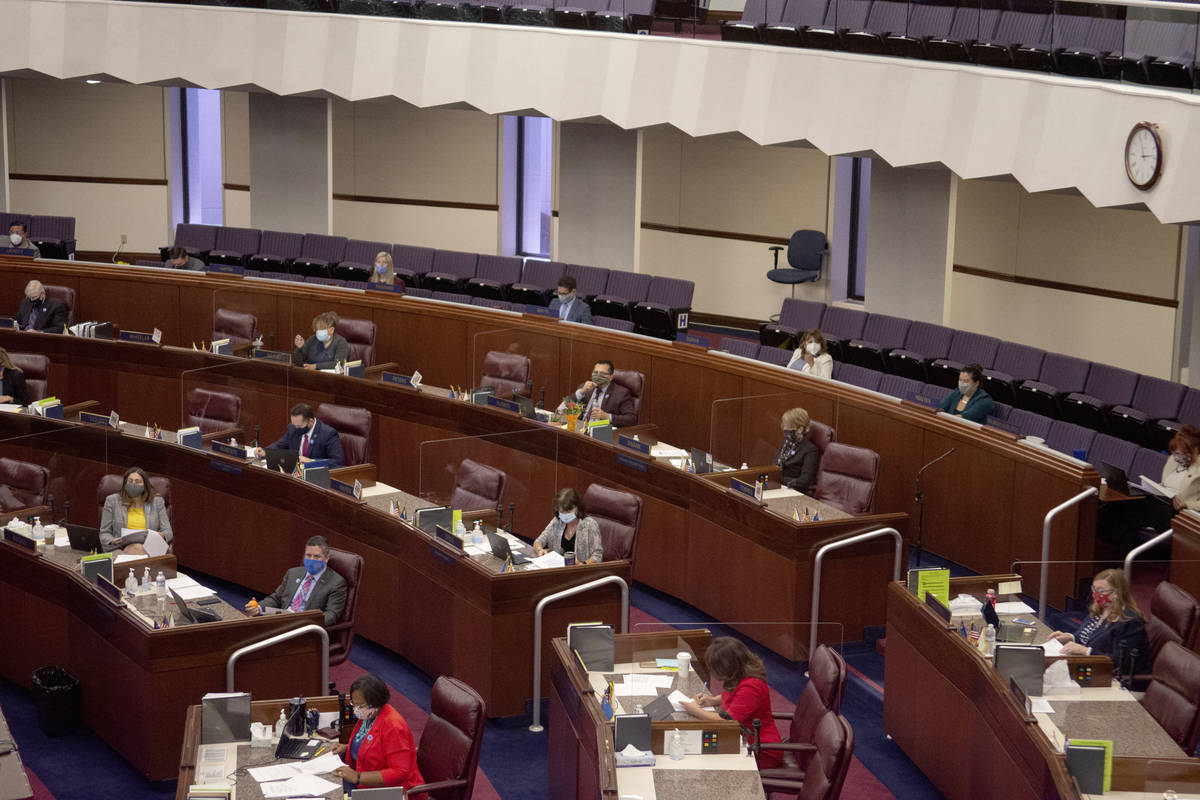EDITORIAL: ‘Fundamental to American jurisprudence’
For the better part of three decades, dozens of Nevada lawmakers have bobbed, weaved, ducked and covered in an effort to deny that the state constitution actually means what it says regarding public employees serving in the Legislature. Last week, a judge finally called foul on this ongoing charade.
Article 3, Section 1 of Nevada’s guiding document is unambiguous: The state government shall consist of three branches — the executive, legislative and judicial — “and no persons charged with the exercise of powers properly belonging to one of these departments shall exercise any functions, apertaining to either of the others, except in cases expressly directed or permitted in this constitution.”
The purpose of this prohibition goes beyond limiting potential conflicts of interest. Instead, it is also grounded in concerns articulated by 18th-century French philosopher Baron de Montesquieu that the consolidation of state power in too few hands is a recipe for oppression and that the levers of government must be independent and separate from each other for liberty to flourish. Montesquieu’s influence on the Founding Fathers was clear. “The accumulation of all powers, legislative, executive and judiciary, in the same hands, whether of one, a few or many, and whether hereditary, self-appointed or elective,” James Madison noted in the Federalist No. 47, “may justly be pronounced the very definition of tyranny.”
The authors of the Nevada Constitution included their own separation of powers clause in recognition of this indispensable principle.
Yet through the years, a host of public employees — most working for the state executive branch or local governments — have flouted the law by occupying seats in Carson City. Legal challenges have either been shot down for technical reasons or rendered moot by developments, In 2011, for instance, the Nevada Policy Research Institute sued over state Sen. Mo Denis serving as both a lawmaker and an employee of the Public Utilities Commission, an executive branch agency. The lawsuit died when Mr. Denis took another job.
Defenders of the status quo — including enablers at the Legislative Counsel Bureau, which offers legal advice to lawmakers — argue that the separation of powers clause prevents only managers or supervisors in the executive or judicial branches from sitting in the Legislature. The language of Article 3, Section 1 makes no such distinction. “When I use a word,” Humpty Dumpty said, in rather a scornful tone, “it means just what I choose it to mean — neither more nor less.”
But perhaps this willful distortion may be on its last legs.
On Monday, Clark County District Judge Richard Scotti threw out the 2019 DUI conviction of a Henderson woman after her attorney noted that the prosecutor, Melanie Scheible, also moonlights as a Democratic state senator. The judge agreed that Ms. Scheible, a sitting lawmaker, was thus ineligible under state law to also exercise the powers of the executive branch as a member of the district attorney’s office.
“It is a violation of procedural due process of nearly the highest order,” Judge Scotti wrote, “for a person to be tried and convicted by a public official who (is) in charge of both writing and enforcing the law. This court finds that it is fundamental to American jurisprudence that a criminal defendant shall not be prosecuted by a person who is simultaneously the law-maker and the law-enforcer of the laws of the state of Nevada.”
Judge Scotti’s seminal ruling has ramifications for other sitting lawmakers, including Nicole Cannizzaro, a prosecutor who moonlights as majority leader of the state Senate. The decision will likely be appealed, potentially forcing the Nevada Supreme Court to take up this important matter. That’s long overdue.
The state constitution’s separation of powers clause stands as a vital bulwark against tyranny. Lawmakers are free to offer amendments loosening its restrictions. Until then, allowing legislators to simply ignore the provision represents an arrogant insult to both taxpayers and the rule of law. Judge Scotti’s forceful and well-reasoned opinion is a giant step toward a resolution of this issue and should be upheld. It’s high time the state judiciary elevated the clear language of the Nevada Constitution above the convenience of the political class.

















